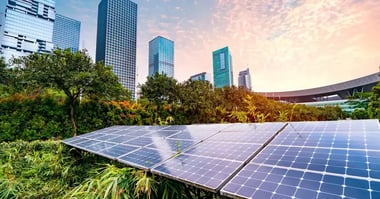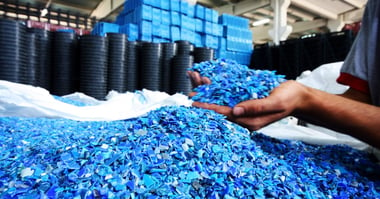
Tamara Davison
Tamara Davison is a journalist who specializes in sustainability and the environment. Reporting from around the world, she's seen firsthand the direct impact waste is having on coastal communities and our oceans. As a diver trained in ecological monitoring, the changes Tamara has seen in marine habitats inspired her to action. She's previously written for The Guardian, The Independent and the Evening Standard. She's also produced environmental documentaries for EuroNews.
Black Friday is one of the year’s busiest shopping periods, with US consumers spending roughly $9.8 billion on lucrative deals during the discount-filled weekend in 2022.
Unsurprisingly, consumerism on such a heightened scale has a toll on the environment. The surge in Black Friday deliveries, excess packaging, and product returns is driving huge emissions. The environmental impact of this year’s Black Friday could be even worse.
Some studies suggest that Black Friday deliveries generate an estimated 429,000 tonnes of greenhouse gases to the environment each year. And the environmental impact of this year’s Black Friday could be even worse.
But can Black Friday ever be kind to the planet? Let’s find out.
What’s on this page?
01 | What’s the overall environmental impact of Black Friday?02 | Why is Black Friday bad for the environment?
03 | Sustainable alternatives to Black Friday
04 | Brands taking a stand against Black Friday
05 | Summary
06 | FAQs
What’s the overall environmental impact of Black Friday?
The retail sector generates 25% of the world’s carbon emissions annually, according to Boston Consulting Group — and Black Friday makes its environmental footprint a lot worse.
From increased plastic packaging waste to heightened carbon emissions, studies have shown that Black Friday has a significant environmental impact. In fact, the amount of waste American households produce between Black Friday and New Year is 25% higher than the rest of the year.
Black Friday's excessive in-store and online discounts also promote impulse buying and overconsumption. Shoppers tend to purchase new electronics on Black Friday, rather than repairing the broken ones, and this disposable mindset hurts our environment.
The short lifespan of products bought on Black Friday also raises concerns. In 2019, a study found that consumers threw away 80% of items purchased on Black Friday after a few uses. Most of these items are destined for landfills, incinerated, or go to low-quality recycling centers.
Why is Black Friday bad for the environment?
Consumers are increasingly conscious of their shopping habits, but the sheer volume of Black Friday sales takes a toll on the environment.
While individual shoppers may justify making just a few extra purchases during Black Friday, millions of others are also doing the same. This excessive consumption model contributes hugely to the environmental problems in the retail and e-commerce industries. Here’s a breakdown of the most pressing Black Friday issues:
Mass consumption
Last year, shoppers in the US broke records by spending over $9.12 billion online during the Black Friday weekend.
The National Retail Federation also added that a record 196.7 million Americans made purchases over the Thanksgiving weekend — an increase of 17 million from the previous year.
It’s alarming that Black Friday sales are growing at this rate, despite the general awareness of the retail industry’s environmental impact.
There are many reasons for this, but retailers play a big role. By slashing prices, offering free delivery, and making shopping processes easier, retailers are encouraging mass consumption. Unfortunately, environmental challenges will continue to escalate as long as shops offer discounts on Black Friday.
Excessive packaging
Global production of plastic packaging reaches more than 141 million tonnes per year. A lot of this is single-use material, and has a limited lifespan.
The surge in sales during Black Friday increases the production and disposal of plastic waste. In fact, a 2022 survey found that US online purchases increased by 13% during the Black Friday weekend that year. This increased consumerism leads to a significant surge in plastic waste from unnecessary purchases.
Amazon is a key example of this and often offers the most substantial Black Friday discounts. As a result of Amazon's Black Friday discounts, transactions increased by around 352% in 2022.
As reported in The Independent, Amazon’s plastic packaging waste equated to around 321,596 metric tonnes in 2022, with Black Friday sales contributing to this total.
Fossil fuel consumption
From manufacturing to transportation, the entire life cycle of a product releases carbon emissions. Again, the scale of demand surrounding Black Friday contributes to a spike in global fossil fuel consumption.
Technology is one of the main sectors for Black Friday sales. According to the New York Times, 86.1% of carbon emissions generated from the lifecycle of a Dell laptop are attributed to manufacture, transport, and end-of-life.
Black Friday amplifies the carbon emissions associated with such in-demand products. Anticipating heightened sales during this time, means more production, more shopping, and more discarded products.
Alongside manufacturing, deliveries also contribute massively to Black Friday carbon emissions. Last year, reports claimed that Black Friday deliveries in the UK emitted the same amount of greenhouse gas as 435 return flights between London and New York. As the ecommerce market continues to grow, emission-heavy deliveries are also set to increase.
Lots of returned items
Returns pose a problem to sustainability in general, but Black Friday sales heighten the issue significantly. That’s because consumers often get distracted by low costs, and tend to make more impulse buys that they could later regret.
A survey of consumers found that 52% regret purchases that they bought on Black Friday. As a result, reports show a 143% surge in product returns in the days following the Black Friday weekend.
Although the findings vary, depending on whether you shop online or in-store, most returns will add to the carbon footprint of the purchase. The Guardian reported that the carbon dioxide generated by returns in the US is the equivalent of 3 million cars.
One study found that the environmental cost of returns can be 30% higher than the initial delivery. This is due to the energy-intensive logistics. When you return a product bought online, lorries or ships will transport them back to warehouses — adding to carbon emissions. Sometimes, manufacturers will need to steam, clean, or re-package returned products in new plastic wrapping.
According to the BBC, retailers can incur costs up to twice the amount of the initial delivery for product returns. Some brands, unprepared to cover these costs, may send returns straight to landfills because it's cheaper.
Disposal of products
Overconsumption promoted by Black Friday means products purchased before and during the sales might have a shorter lifecycle than regular retail sales. For instance, people may discard things like an old phone for a newer version on Black Friday — even if their old device still works.
In 2022, people threw away 5.3 billion mobile phones, most of which didn’t get recycled despite containing valuable elements inside them. On top of this, each year 80% of items bought on Black Friday are thrown away, some without being used at all.

Sustainable alternatives to Black Friday
Black Friday is a significant challenge for the environment. However, shifting consumer perspectives, increased education, and positive brand communication can create a more sustainable retail landscape.
There are many ways that the retail industry is starting to boycott Black Friday. This includes several eco-friendly alternative events and in-store sustainable initiatives.
Green Friday
Green Friday is an environmentally friendly response to Black Friday sales. Celebrated on the same day as Black Friday (November 24), this sustainable movement is trying to raise awareness of negative shopping habits and promote sustainable retail practices.
People mark Green Friday in multiple ways. Some choose to boycott stores that are advertising Black Friday, while others ditch technology and go for a walk in nature to avoid scrolling through online sales altogether.
Some retailers are also starting to support Green Friday initiatives. Vodaphone, for example, decided to launch ‘Bring Back Friday’, which encouraged consumers to return old devices for recycling. In 2022, IKEA also offered a 50% discount on items in exchange for returning old Idea furniture.
Blue Friday
Sharing a similar sentiment to Green Friday, Blue Friday is another eco-friendly alternative to November sales. The day encourages consumers to take responsibility for their shopping habits, shop local, and support brands that are kind to the environment and ocean.
Brands that partner with the Blue Friday initiative demonstrate their commitment by donating a portion of their sales to ocean conservation efforts. Since its inception, Blue Friday organizers have raised thousands of dollars to support plastic waste clean-up initiatives.
CleanHub is also making Black Friday Blue this year, in a bid to prevent even more plastic from reaching the oceans than usual. As part of our new Black Friday campaign, brands working with us can opt to fund the collection of an extra 1kg/1lb of plastic for every purchase made through their store.
Want to see which brands are participating in CleanHub’s Black Friday campaign? Check out our new Brand Directory to find out.
Brands taking a stand against Black Friday
An environmental consciousness is emerging among brands, with several major players taking a stand, or announcing an unconventional approach, to Black Friday. Here are some key examples:
- The Ordinary: This skincare brand’s parent company, Deciem, wants to combat mass consumerism by embracing “Slowvember.” Throughout November, shoppers get 23% off all skincare products. The Ordinary directly boycotts Black Friday by closing its website and stores on the day.
- Patagonia: Arguably one of the most well-known conscious clothing brands, it’s no surprise that Patagonia doesn’t take part in Black Friday sales. Instead, they’re encouraging people to learn how to repair clothes and enjoy some outdoor time with their loved ones.
- Freitag: Yet another brand saying no to consumerism is Freitag. Over the years, Freitag has opted to close its stores on Black Friday. This year, the brand is encouraging people to borrow items instead. The outlet said: “On the afternoon of Black Friday, all F‑Stores will become temporary lending outlets. During this time, you can choose a model in the store itself, then borrow and test it extensively until December 8, 2023, all completely free of charge.”
Summary
A lot of people are struggling financially this year, so it’s easy to see why discounts can be attractive. The thing is, the negative impact of Black Friday doesn’t just impact our planet — it also impacts everyone on it.
That’s why we should be working toward a circular economy, where people repair, recycle, and reuse items. The aim of this is to establish a more balanced economy that’s kind to both the planet and our wallets all year round.
In today's world, there is no longer room for a single day of peak consumerism. As retail structures shift toward a more circular economy, we’re hopeful that more brands will find value in ditching Black Friday sales and supporting conscious shopping instead.
If brands like The Ordinary can close their stores on Black Friday and remain so popular among shoppers, then so can you. To connect with consumers that matter, embrace Green/Blue Friday and focus on building sustainability across your business models.
At CleanHub, we help brands improve their environmental impact and reduce plastic waste. Want to know which brands are working with us to help our planet? Check out our Brand Directory to see the businesses committed to tackling plastic waste with us.
FAQs
Why is Black Friday not sustainable?
Black Friday is unsustainable as it promotes a model of overconsumption. As a result of increased demand, manufacturers ramp up production and transport as part of their sales process. This consumes more resources and energy, taking a toll on our environment.
How much does Black Friday cost the environment?
The true environmental cost of Black Friday is difficult to quantify. That’s because the impacts of Black Friday this year will have long-lasting effects on our environment, oceans, and public health. But to put things into perspective, Black Friday 2023 deliveries will emit at least 429,000 tonnes of greenhouse gases into the atmosphere, according to Waste Managed.
Which part of Black Friday creates the most pollution?
Plastic waste and air pollution are the two biggest byproducts of Black Friday sales. This is largely linked to the manufacturing of products as well as the eventual disposal of products. 2023 is the time for retailers to rethink traditional shopping and embrace a sustainable model.

.webp)
.webp?width=380&name=Plastic-on-the-beach%20(1).webp)


.webp?width=380&name=ESG-presentation%20(1).webp)
.webp?width=380&name=Buying-online%20(1).webp)
.webp?width=380&name=Sustainable%20christmas%20(1).webp)


.webp?width=380&name=Sorting-trash%20(1).webp)
.webp?width=380&name=Shopping%20for%20sustainable%20beauty%20products%20(1).webp)
